The latest Last Week Tonight episode began by focusing on the midterms before John Oliver moved on to the main topic: Housing. Again, you ask? It is indeed not the first time the show has approached this topic. Season 7, Episode 17 tackled evictions, and Season 8, Episode 18 tackled housing discrimination. This episode touches upon both problems as once again the late-night show discusses many of the issues concerning housing in America, specifically, overpriced rents.
There's no avoiding the fact that rents have been skyrocketing. Chances are that either you or someone you know is struggling to find somewhere to live because rent prices are unaffordable. Or, alternatively, they are being subjected to being priced out of where they currently live by their landlord. But, as Oliver explains, this is not a recent problem but a situation that was present before, sometimes from decades past, and is only getting worse. For instance, Los Angeles has been considered “unaffordable” as far back as 1979.
Rents have been surpassing wages, and right now, there is not a single county in America wherein someone who earns minimum wage can afford to pay the rent for a modest two-bedroom home. The fact of the matter is that there are not enough affordable houses. Some Landlords blame “the market rate” for the rising rent prices, however, while there is some truth to that it does not excuse the dehumanization that some tenants suffer, such as harassment with situations like incessant construction in their complex.
Millions of people are spending half or more of their income on housing, which is not sustainable by any means. Housing Choice Vouchers, better known as Section 8, which were created to help struggling tenants, are not only underfunded but also provide no guarantee that a landlord will accept them. As things are right now, many low-income renters will have to be confronted with the threat of eviction, which is, in the host’s words: “invasive, traumatizing” and “disproportionately affects black people.” As we had learned about in the Evictions episode, when someone gets evicted that can stay on their record for years, deeply affecting their housing prospects. Oliver concedes that there are some things that should stay on one’s record, like “war crimes”, however, being evicted, or even, having fought eviction in court, is not one of them.
The root of the problem is, as Oliver boils it down, that there are many people who think investments “deserve more respect than basic human needs.” The current state of things is that some people are being stripped of choice because they can’t afford housing, and they can’t get help. As for the things that can be done, the host suggests passing rent stabilization laws. These are laws that protect tenants against discrimination of housing choice vouchers, laws to seal away eviction records, and laws that make mandatory the right to counsel in housing court. But the truth is, there needs to be a change in mindset, so people start believing and acting upon the belief that housing is a basic human right.


.jpeg)